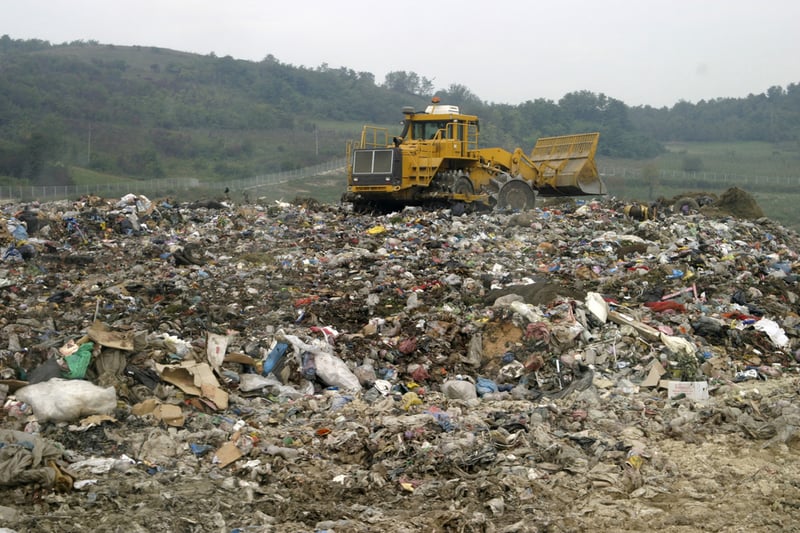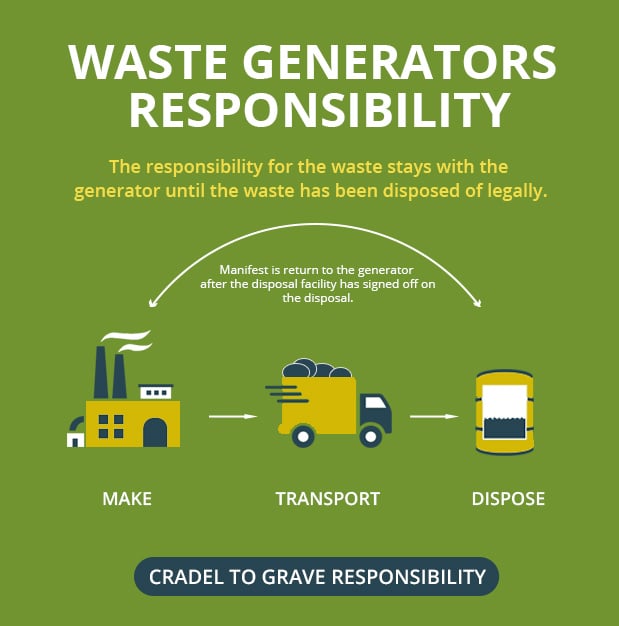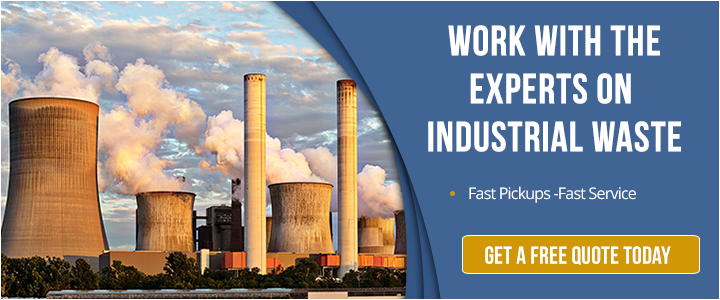Each year, American industries generate and dispose of about 7.6 billion tons of industrial solid waste. And as environmental regulations in the United States have become stricter, it’s important that your manufacturing company understands how disposal is managed when it comes to handling industrial waste generated in your facility.
Improper handling of industrial waste can have devastating consequences to the environment. Harmful waste released into the air, soil and water pose a serious threat to this region. But improperly handling industrial waste can also pose a threat to your company’s reputation and future through costly fines and damaging publicity.

But how is industrial waste disposal managed? The answer to that is largely based on the type of waste you generate. Once that is determined, you can better gauge how to manage it and what kind of help is available to ensure compliance.
What Is Industrial Waste?
Any unwanted or residual materials that result from industrial operations are considered industrial waste. Though a general, all-encompassing term, industrial waste actually includes several types of waste:
- Industrial solid waste: There are several kinds of industrial solid waste, from animal remains to food, non-recyclable glass and electrical components. Often, these items reach landfills.
- Toxic or hazardous waste: This type of waste can cause harm to humans, animals and the environment in general. This waste can contaminate waterways, including rivers and lakes, causing widespread damage if not handled properly. Generally, these materials are byproducts of other materials generated at factories, hospitals and other manufacturing facilities.
- Chemical waste: Factories, plants and other types of processing centers typically generate this type of waste, which include various types of chemicals and their residues.
It’s important to understand what type of industrial waste you are generating, because how that waste is managed and what regulations you are subject to may differ among the various types of waste.
How Is It Managed?
Industrial waste management uses technology and services to properly dispose of waste while keeping companies fully compliant and environmentally-friendly.
While there are several facilities in southern California where you can drop off your industrial waste, it’s important to first check to see if the facility accepts the type of waste you are disposing. Very few, for example, accept hazardous waste drop-offs. Other landfills and recycling centers may accept solid waste, depending on the type.
On the other hand, hazardous waste disposal companies offer a pick-up option in which they will then properly dispose of the waste. It’s important for you to know, as a generator, that you understand the law when it comes to responsibility for the waste, whether it’s hazardous or non-hazardous.

In the case of hazardous industrial waste, for example, the law dictates a “cradle to grave” requirement that all generators are responsible for the proper disposal of their hazardous waste streams.
This is the primary reason why virtually all waste generators use a reputable disposal company.
That means, as a hazardous waste generator, you are legally and financially responsible for that waste from the time it is created until it’s been properly treated, transported and disposed of, or “cradle to grave.” Hiring a certified and reputable company to help you manage this process can help alleviate any issues that might arise once waste leaves your facility.
If your facility generates industrial wastewater, on the other hand, many counties require that you obtain an industrial waste disposal permit. In Los Angeles County, for example, any business that generates, handles or disposes of industrial wastewater must obtain this permit.
As part of the review process, the Industrial Waste Unit of Public Works will determine if your facility has adequate pre-treatment systems. If approved, your business must then obtain clearance and a permit in order to discharge the wastewater into sanitary sewers, private disposal systems or offsite disposal facilities.
What Help Is Available?
How your industrial waste is managed and disposed of largely depends on what type of waste it is. It can be confusing, and difficult, to determine this in the first place, and then know what hazardous waste disposal process must go through.
Because of this, enlisting the help of a waste disposal service can assist you with managing your industrial waste and complying with any local, state and federal guidelines. Determining if your industrial waste can be classified as non-hazardous also can provide substantial cost savings and alleviate any issues with the California Department of Toxic Substances Control.
When working with a waste disposal company, it’s important to look for these characteristics:
- Credibility - Don’t be afraid to do a background check and ask for references.
- Experience - If you produce various waste streams, hiring a company that is experienced in identifying them and following proper procedures with each is critical.
- Flexibility - Your needs may change over time, which is why it’s important to work with a disposal company that can manage different legal requirements as your waste streams change.
- Offer a walk-through program - A company that evaluates your business can offer important insight into important areas of focus, including:
- Waste manifesting
- Hazardous waste procedures
- Waste storage evaluation
- Emergency readiness
- Hazardous waste evaluation
- Employee training procedures
Bottom Line
Improper handling of industrial waste - whether non-hazardous or hazardous - can have serious implications for both your company and your community.
Understanding how your particular stream of industrial waste should be managed is the first step to ensuring all local, state and federal regulations are being met.
A certified waste disposal company can walk you through this process and help you determine your industrial waste streams, how to manage them and ultimately how to properly dispose of them.


Comment